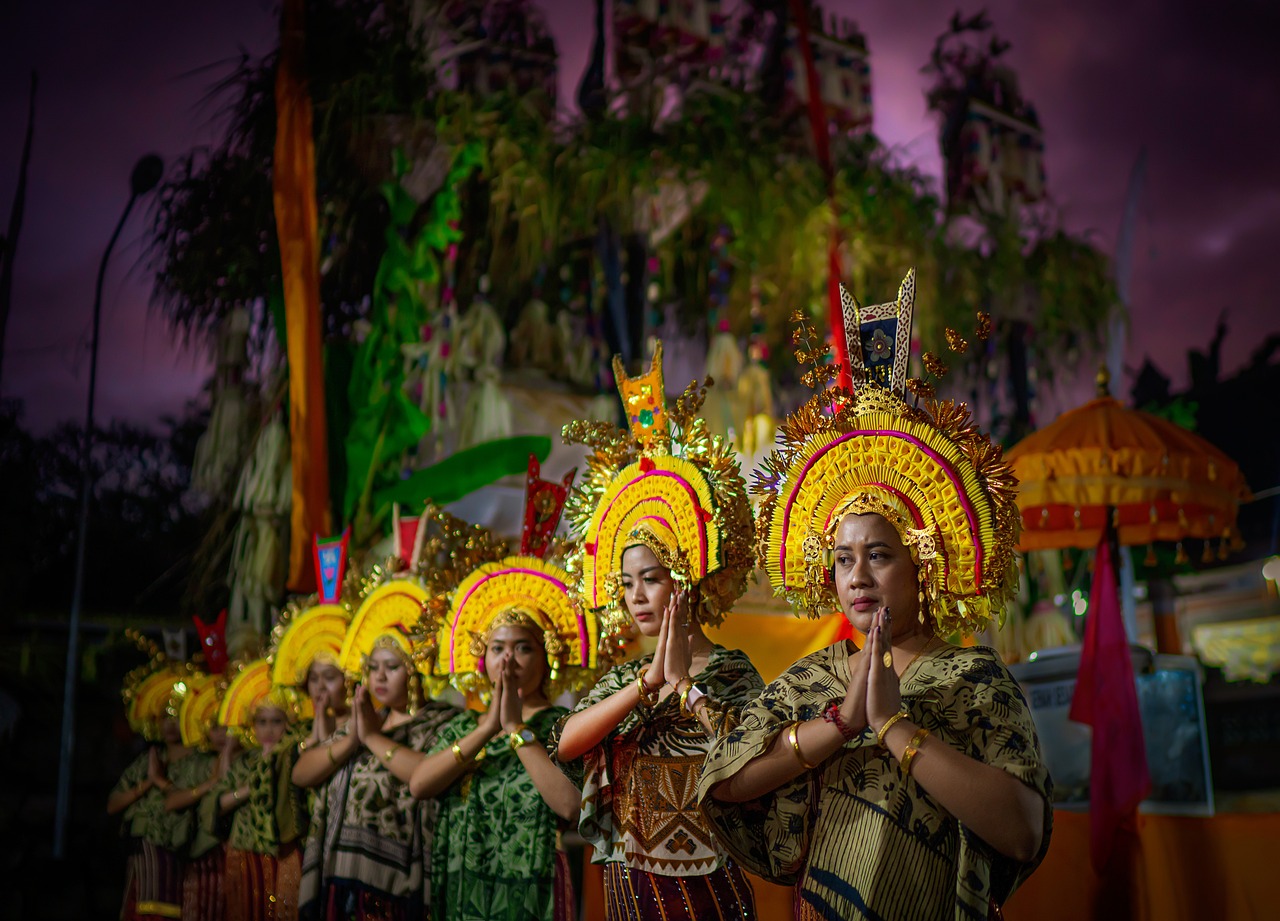Full Moon Ceremonies, known as “Purnama” in Bali, are spiritually significant events that showcase the island’s rich culture. But also for the party crowd Bali has amazing things to offer when the moon is full. This article explores the profound meaning, rituals, and significance of Full Moon Ceremonies in Bali, providing travelers with insights into how to witness and respectfully participate in these captivating lunar celebrations – and where to join the full moon parties.

Unveiling Full Moon Ceremonies in Bali
Moon-related Ceremonies hold deep spiritual significance in Balinese Hinduism. They are dedicated to worshiping the gods and ancestors, seeking blessings, and purifying the mind and soul – but also the return of the ancestors.
Balinese Hinduism follows a unique lunar calendar. And Full Moon Ceremonies occur on specific dates corresponding to the moon cycle. These ceremonies are an integral part of the island’s cultural and religious tapestry.
Such Ceremonies are often held at temples across Bali. These celebrations involve offerings, prayers, traditional dances, and music. They provide a glimpse into the island’s vibrant cultural heritage.
Such Ceremonies are first of all communal events that bring families and communities together. They strengthen social bonds, and the sense of togetherness is central to the Balinese way of life.
Purnama Kajeng
In addition to the regular Full Moon Ceremonies, Bali observes a special occasion known as “Purnama Kajeng” every 15 days, aligning with the lunar calendar. This day is considered auspicious for spiritual activities and purification rituals.
Learn more about Authentic Bali in our Glossary
Experiencing Full Moon Ceremonies
Travelers are welcome to observe these Ceremonies in Bali with respect and modesty. It’s customary to wear a sarong and sash when entering temples or participating in these sacred events.
Traveler’s Tip: While visiting Bali, inquire locally or check the lunar calendar to see if your trip coincides with a Full Moon Ceremony. It’s a unique opportunity to witness the island’s rich cultural and spiritual heritage.
Lunar Calendar Basis: these Ceremonies are rooted in lunar calendars, with different cultures and traditions around the world celebrating full moons. This applies also to Bali, which is using their own Hindu calendar.
Full Moon Ceremonies typically hold deep spiritual meaning. They are often associated with cleansing, renewal, and the release of negative energies. People use this time to meditate, reflect, and seek blessings.

Ancestors on Vacation
During Full Moon Ceremonies, it’s believed that the spirits of deceased ancestors visit their living relatives. To welcome these spirits, families prepare offerings and set an extra place at their dining tables. It’s a unique and heartwarming tradition that reflects the strong bond between the living and the departed in Balinese culture.
5 lesser-known facts about the Moon in Bali
- Saka Calendar: The Balinese Hindu calendar, also known as the Saka calendar, is actually a lunar calendar. Its phases are synchronized with the moon’s cycles.
- Tumpek: Apart from the new and full moons, the Balinese calendar also has special days called “Tumpek,” which are dedicated to specific entities like animals, tools, and musical instruments. These also follow the lunar cycles.
- Eclipses: Solar and lunar eclipses, known as “gerhana matahari” and “gerhana bulan” respectively, are significant in Balinese Hinduism. They are considered powerful cosmological events. The Balinese typically observe specific rituals and ceremonies during eclipses to maintain harmony and balance in the universe.
- Mythology: In Balinese myths and legends, the moon, along with the sun, is often depicted as a chariot driven by deities. These myths explain the natural phenomena related to the moon and its phases.
- Fasting and Meditation: On certain moon phases, especially on Tilem (new moon), it’s common for devout Balinese Hindus to engage in fasting, meditation, and other ascetic practices as a form of self-purification.
The moon, in Balinese Hinduism as in many other cultures, is seen not just as an astronomical body, but as a spiritual entity with significant religious and cultural symbolism. Its phases serve as markers for various ceremonies and rituals, and its presence is woven deeply into the fabric of Balinese spiritual and cultural life.
Full Moon Parties in Bali
While spirituality takes a large part of the balinese fascinating culture, it is also known for its night life. Especially in full moon nights there often is a great party somewhere. Check out especially the Ubud-crowd, but recently also Uluwatu. Check out instagram for more info.
FAQ
What are balinese Full Moon Ceremonies?
Known as Purnama in Bali, these ceremonies are spiritual and cultural events celebrated during the full moon. They often involve rituals, offerings, prayers, and gatherings to seek blessings, cleanse the spirit, and honor deities or ancestors.
Why are Full Moon Ceremonies in Bali celebrated?
For various reasons, including spiritual purification, seeking blessings, and paying homage to deities or ancestors. They are believed to help release negative energies, promote well-being, and strengthen the community’s spiritual bond.
When do Full Moon Ceremonies occur?
They occur on specific dates corresponding to the full moon, according to lunar calendars. In Bali and other regions with strong lunar traditions, these ceremonies are held regularly throughout the year, each with its unique significance.
What are the common rituals during Full Moon Ceremonies?
Rituals during moon-related Ceremonies may vary depending on the culture and tradition. Common elements often include making offerings, lighting lamps or candles, meditating, and attending temple ceremonies. Water purification rituals and traditional dances are also prevalent.
How can travelers in Bali participate in Full Moon Ceremonies?
Travelers are generally welcome to observe all Ceremonies with respect and modesty. It’s advisable to wear appropriate attire, such as a sarong and sash, when entering temples or participating in sacred events. Observing quietly and following local customs is appreciated.
